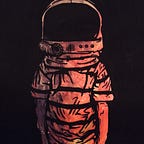Insomniac: A Love Story
There are three types of insomnia: acute, transient and chronic. I expect that most everyone has experience with the first and possibly the second forms. Acute insomnia is defined as one or two short nights generally due to some situational stressor. Once the stressor has passed, a return to normal is imminent. Transient insomnia lasts upwards of a week, consisting of at least 3 nights of disrupted sleep, and is often consistent with a period of adjustment to a new environment or routine.
Rarely does the mention of insomnia in conversation, in my experience, not spark a rousing chorus of “I slept like crap” anecdotes. I usually just listen and nod. I suspect that veterans with “near miss” stories are, in a similar fashion, more apt to share than the double amputee with shrapnel in their chest. There is a nigh imperceptible tipping point between the casual tryst, with the enticements of flirtation and romance, and actual betrothal to a wretched bedfellow.
On that point, I have been wed to insomnia for 35 years and, in light of our coral anniversary, I felt it opportune to share a bit of our story together. I am 50 this year and average 5 hours per night, never more than 3 to 4 hours contiguous. Short of high doses of pharmaceutical barbiturates, which I refuse to introduce as they’re simply another problem I don’t need, my condition finds me impervious to sleep medications or herbal remedies. A night in the sleep clinic confirmed that I do not have apnea, weight or respiratory related issues but that it takes me ~80 minutes to sink into sleep and that my mind and body both remain active throughout.
Chronic sufferers’ experiences are unique and varied which is why I emphasize that mine is but one and not representative of the whole. The most challenging aspect of life with insomnia is its incompatibility with “normal” schedules. Despite the persistent misconception, there is no “making up” of sleep. Given a recommended 7 hours per night, the average person will have slept in four nights as many hours as I manage over an entire week. Translated, this means that in any given year, I have the equivalent of 140+ nights with no sleep whatsoever. Let that register.
To be clear, I get 4 to 5 hours most nights but there are times when it is less or not at all, just as there are occasions when I crash for a day or two and can barely crawl out of bed, those being the exceptions. We can disabuse ourselves of another myth people tend to foment about extreme sleep deprivation leading to one’s demise. To my knowledge, there is only one form of fatal insomnia, an extremely rare genetic condition responsible for Fatal Family Insomnia, and it is the degeneration symptomatic of the affliction, rather than lack of sleep, that result in death: https://www.theatlantic.com/health/archive/2015/02/insomnia-that-kills/384841/.
Yet, while there is no direct evidence that insomnia leads to one’s demise, there is research that suggests it may hasten it to a degree, life spans being shortened by as many as 10 years. Be that as it may, a more pressing concern is the effect on cognitive function and memory. The last 5 years have seen me in steep decline on those fronts. My mind struggles for traction most of the day making it challenging to engage socially, come to decisions or perform tasks requiring considered attention.
Of course, you’re already irritable. You haven’t slept. Your body is achy because it never fully rests. Your mind is a fog. And now you have to put in the same day as everyone else while running on a flat tire with a half-tank to their full, which is brimming. As with all chronicity, you grow accustomed as it becomes your normal. Usually, you get by through either sheer will or by means of coping strategies that invariably cease working or become problematic themselves.
Willpower is a young person’s game and as a young man it was my daily driver. Years of wear and tear have forced me to retire that trusty old jalopy and, as I’ve mentioned, the crutches I’d substituted are also now rubbish. Cannabis, which I started using upon a doctor’s recommendation only 3 years ago, works a treat to calm me and sand down my edges but it is no solution. I never cottoned to alcohol but will capitulate to it being rather effective at helping you fall asleep and understand why some insomniacs develop a nightcap habit. Personally, though, I find that alcohol and medication don’t provide restful sleep and leave you hungover. I’ve also tried CBT-I, sleep journals, sunlamps, sleep hygiene, all to no avail.
As to the matter of memory, keep in mind that, for me, the past 35 years lays out as one long day broken up by the occasional nap. I find it vexing to keep memories sorted, distinguish lived experience from half-waking dreams and, of late, damn near impossible to hold on to new information. In many ways, every day is now quite literally new. The hundreds of films and thousands of books I’ve consumed can be enjoyed once again as though for the first time. I suppose this will ring with the optimists in the crowd. Otherwise, I cannot point to a more frustrating facet of insomnia than that of the fragmentation of function and memory.
Then again, perhaps it will also prove to be its one grace.
